
List of leaders of Afghanistan
Encyclopedia
Prior to the 18th century, the modern state of Afghanistan
was divided and mostly ruled by the Delhi Sultanate
of India
. Its Herat
region in the west was ruled by the Safavids
of Persia
and the Mazar-i-Sharif area in the north by the Khanate of Bukhara
. The southern Kandahar
region occasionally switched sides between the Mughal Empire
and the Safavids. The native Afghans (Pashtun people
) had been oppressed by both sides, and were pushing for independence
but many attempts had been crushed and those accused of starting revolution
being executed.
In 1709, Mirwais Hotak and his Afghan tribal chiefs from Kandahar organized themselves and successfully freed their land from Persian rule. Mirwais built a large fortress for himself and turned the town of Kandahar to serve as the capital
of the Hotaki Empire. After a long series of wars, this empire was eventually replaced by the Durrani
Afghan Empire
that was founded by Ahmad Shah Durrani
in 1747. Ahmad Shah Durrani is regarded as the "Father of the Nation
", Mirwais Hotak as the "Grand father" and Mohammed Zahir Shah
as the last King of Afghanistan.
Barakzai dynasty
Afghanistan
Afghanistan , officially the Islamic Republic of Afghanistan, is a landlocked country located in the centre of Asia, forming South Asia, Central Asia and the Middle East. With a population of about 29 million, it has an area of , making it the 42nd most populous and 41st largest nation in the world...
was divided and mostly ruled by the Delhi Sultanate
Delhi Sultanate
The Delhi Sultanate is a term used to cover five short-lived, Delhi based kingdoms or sultanates, of Turkic origin in medieval India. The sultanates ruled from Delhi between 1206 and 1526, when the last was replaced by the Mughal dynasty...
of India
India
India , officially the Republic of India , is a country in South Asia. It is the seventh-largest country by geographical area, the second-most populous country with over 1.2 billion people, and the most populous democracy in the world...
. Its Herat
Herat
Herāt is the capital of Herat province in Afghanistan. It is the third largest city of Afghanistan, with a population of about 397,456 as of 2006. It is situated in the valley of the Hari River, which flows from the mountains of central Afghanistan to the Karakum Desert in Turkmenistan...
region in the west was ruled by the Safavids
Safavid dynasty
The Safavid dynasty was one of the most significant ruling dynasties of Iran. They ruled one of the greatest Persian empires since the Muslim conquest of Persia and established the Twelver school of Shi'a Islam as the official religion of their empire, marking one of the most important turning...
of Persia
Iran
Iran , officially the Islamic Republic of Iran , is a country in Southern and Western Asia. The name "Iran" has been in use natively since the Sassanian era and came into use internationally in 1935, before which the country was known to the Western world as Persia...
and the Mazar-i-Sharif area in the north by the Khanate of Bukhara
Khanate of Bukhara
Khanate of Bukhara was a significant state in Central Asia from the second quarter of 16th century to the late–18th century. Bukhara became the capital of the short-lived Shaybanid empire during the reign of Ubaydallah Khan . The khanate reached its greatest extent and influence under its...
. The southern Kandahar
Kandahar
Kandahar is the second largest city in Afghanistan, with a population of about 512,200 as of 2011. It is the capital of Kandahar Province, located in the south of the country at about 1,005 m above sea level...
region occasionally switched sides between the Mughal Empire
Mughal Empire
The Mughal Empire , or Mogul Empire in traditional English usage, was an imperial power from the Indian Subcontinent. The Mughal emperors were descendants of the Timurids...
and the Safavids. The native Afghans (Pashtun people
Pashtun people
Pashtuns or Pathans , also known as ethnic Afghans , are an Eastern Iranic ethnic group with populations primarily between the Hindu Kush mountains in Afghanistan and the Indus River in Pakistan...
) had been oppressed by both sides, and were pushing for independence
Independence
Independence is a condition of a nation, country, or state in which its residents and population, or some portion thereof, exercise self-government, and usually sovereignty, over its territory....
but many attempts had been crushed and those accused of starting revolution
Revolution
A revolution is a fundamental change in power or organizational structures that takes place in a relatively short period of time.Aristotle described two types of political revolution:...
being executed.
In 1709, Mirwais Hotak and his Afghan tribal chiefs from Kandahar organized themselves and successfully freed their land from Persian rule. Mirwais built a large fortress for himself and turned the town of Kandahar to serve as the capital
Capital City
Capital City was a television show produced by Euston Films which focused on the lives of investment bankers in London living and working on the corporate trading floor for the fictional international bank Shane-Longman....
of the Hotaki Empire. After a long series of wars, this empire was eventually replaced by the Durrani
Durrani
Durrani or Abdali is the name of a chief Pashtun tribal confederation in Afghanistan and Pakistan. Originally known by their ancient name Abdali later as Durrani they have been called Durrani since the beginning of the Durrani Empire in 1747. The number of Durranis are estimated to be roughly 16%...
Afghan Empire
Durrani Empire
The Durrani Empire was a Pashtun dynasty centered in Afghanistan and included northeastern Iran, the Kashmir region, the modern state of Pakistan, and northwestern India. It was established at Kandahar in 1747 by Ahmad Shah Durrani, an Afghan military commander under Nader Shah of Persia and chief...
that was founded by Ahmad Shah Durrani
Ahmad Shah Durrani
Ahmad Shah Durrani , also known as Ahmad Shāh Abdālī and born as Ahmad Khān, was the founder of the Durrani Empire in 1747 and is regarded by many to be the founder of the modern state of Afghanistan.Ahmad Khan enlisted as a young soldier in the military of the Afsharid kingdom and quickly rose...
in 1747. Ahmad Shah Durrani is regarded as the "Father of the Nation
Father of the Nation
Father of the Nation is an honorific title given to a man considered the driving force behind the establishment of their country, state or nation...
", Mirwais Hotak as the "Grand father" and Mohammed Zahir Shah
Mohammed Zahir Shah
Mohammed Zahir Shah was the last King of Afghanistan, reigning for four decades, from 1933 until he was ousted by a coup in 1973...
as the last King of Afghanistan.
Hotaki dynasty (1709-1738)
| Name | Picture | Reign started | Reign ended |
|---|---|---|---|
| Mirwais Hotak Wali Walī , is an Arabic word meaning "custodian", "protector", "sponsor", or authority as denoted by its definition "crown". "Wali" is someone who has "Walayah" over somebody else. For example, in Fiqh the father is wali of his children. In Islam, the phrase ولي الله walīyu 'llāh... |
April 1709 | October 1715 | |
| Abdul Aziz Hotak Abdul Aziz Hotak Abdul Aziz Hotak , was the second ruler of the Ghilzai Hotaki dynasty of Kandahar, in what is now the modern state of Afghanistan. He was crowned in 1715 after the death of his brother, Mirwais Hotak. He is the father of Ashraf Hotaki, the fourth ruler of the Hotaki dynasty... |
 |
October 1715 | 1717 |
| Mahmud Hotaki Shah Shāh is the title of the ruler of certain Southwest Asian and Central Asian countries, especially Persia , and derives from the Persian word shah, meaning "king".-History:... |
1717 | 1725 | |
| Ashraf Hotaki |
1725 | 1730 | |
| Hussain Hotaki |
1725 | 1738 |
Durrani dynasty (1747-1842)
| Name | Picture | Reign started | Reign ended |
|---|---|---|---|
| Ahmad Shah Durrani Ahmad Shah Durrani Ahmad Shah Durrani , also known as Ahmad Shāh Abdālī and born as Ahmad Khān, was the founder of the Durrani Empire in 1747 and is regarded by many to be the founder of the modern state of Afghanistan.Ahmad Khan enlisted as a young soldier in the military of the Afsharid kingdom and quickly rose... Shah Shāh is the title of the ruler of certain Southwest Asian and Central Asian countries, especially Persia , and derives from the Persian word shah, meaning "king".-History:... |
July 1747 | 16 October 1772 | |
| Timur Shah Durrani Timur Shah Durrani Timur Shah Durrani , was the second ruler of the Durrani Empire from October 16, 1772, until his death in 1793. An ethnic Pashtun, he was the second and eldest son of Ahmad Shah Durrani.- Early life :... |
16 October 1772 | 18 May 1793 | |
| Zaman Shah Durrani Zaman Shah Durrani Zaman Shah Durrani , , was ruler of the Durrani Empire from 1793 until 1800. He was the grandson of Ahmad Shah Durrani and the fifth son of Timur Shah Durrani... |
18 May 1793 | 25 July 1801 | |
| Mahmud Shah Durrani Mahmud Shah Durrani Mahmud Shah Durrani was born Prince and ruler of the Durrani Empire between 1801 and 1803, and again between 1809 and 1818... |
 |
25 July 1801 | 13 July 1803 |
| Shuja Shah Durrani Shuja Shah Durrani Shuja Shah Durrani was ruler of the Durrani Empire from 1803 to 1809. He then ruled from 1839 until his death in 1842. Shuja Shah was of the Sadozai line of the Abdali group of Pashtuns... |
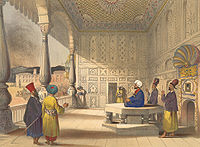 |
13 July 1803 | 3 May 1809 |
| Mahmud Shah Durrani Mahmud Shah Durrani Mahmud Shah Durrani was born Prince and ruler of the Durrani Empire between 1801 and 1803, and again between 1809 and 1818... |
 |
3 May 1809 | 1818 |
| Ali Shah Durrani Ali Shah Durrani Sultan Ali Shah Durrani was ruler of the Durrani Empire from 1818 to 1819. He was the son of Timur Shah Durrani, and the penultimate Durrani Emperor. He was deposed by his brother Ayub Shah.-External links:*... |
 |
1818 | 1819 |
| Ayub Shah Durrani Ayub Shah Durrani Ayub Shah, a son of Timur Shah, ruled Afghanistan from 1819 to 1823. The loss of Kashmir during his reign opened a new chapter in Indian history. In 1823, he was deposed and imprisoned by the Barakzai, marking the end of the Durrani dynasty. He fled to Punjab after buying his freedom and died... |
 |
1819 | 1823 |
| Shuja Shah Durrani Shuja Shah Durrani Shuja Shah Durrani was ruler of the Durrani Empire from 1803 to 1809. He then ruled from 1839 until his death in 1842. Shuja Shah was of the Sadozai line of the Abdali group of Pashtuns... |
 |
7 August 1839 | 5 April 1842 |
Barakzai dynastyBarakzai dynastyThe Barakzai dynasty ruled Afghanistan from 1826 until 1929 or 1973 when the monarchy rule finally ended under Mohammad Zahir Shah. The Barakzai dynasty was established by Dost Mohammad Khan after the Durrani dynasty of Ahmad Shah Durrani was removed from power...
(1826-1973)
| Name | Picture | Reign started | Reign ended |
|---|---|---|---|
| Dost Mohammad Khan Dost Mohammad Khan Dost Mohammad Khan was the Emir of Afghanistan between 1826 and 1863. He first ruled from 1826 to 1839 and then from 1843 to 1863. He was the 11th son of Sardar Pāyendah Khan who was killed by Zaman Shah Durrani in 1799... Emir Emir , meaning "commander", "general", or "prince"; also transliterated as Amir, Aamir or Ameer) is a title of high office, used throughout the Muslim world... |
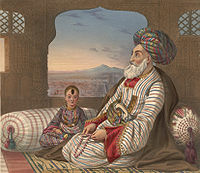 |
1826 | 2 August 1839 |
| Akbar Khan Akbar Khan Amir Akbar Khan Amir Akbar Khan Amir Akbar Khan (1816 – 1846;, born as Mohammad Akbar Khan and famously known as Wazir Akbar Khan, was an Afghan Prince, a general, a tribal leader and Emir. He was active in the First Anglo-Afghan War, which lasted from 1839 to 1842... Emir Emir , meaning "commander", "general", or "prince"; also transliterated as Amir, Aamir or Ameer) is a title of high office, used throughout the Muslim world... |
December 1842 | 1845 | |
| Dost Mohammad Khan Dost Mohammad Khan Dost Mohammad Khan was the Emir of Afghanistan between 1826 and 1863. He first ruled from 1826 to 1839 and then from 1843 to 1863. He was the 11th son of Sardar Pāyendah Khan who was killed by Zaman Shah Durrani in 1799... |
 |
1845 | 9 June 1863 |
| Sher Ali Khan Sher Ali Khan Sher Ali Khan was Amir of Afghanistan from 1863 to 1866 and from 1868 until his death in 1879. He was the third son of Dost Mohammed Khan, founder of the Barakzai Dynasty in Afghanistan.... |
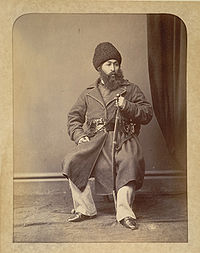 |
9 June 1863 | May 1866 |
| Mohammad Afzal Khan Mohammad Afzal Khan Mohammad Afzal Khan was the Emir of Afghanistan from 1865 to 1867. The oldest son of Dost Mohammed Khan, Afzal Khan seized power from his brother Sher Ali Khan three years after their father's death. Following Afzal Khan's death the following year, Mohammad Azam Khan was reinstated as Amir of... |
May 1866 | 7 October 1867 | |
| Muhammad Azam Khan |
7 October 1867 | 21 February 1868 | |
| Sher Ali Khan Sher Ali Khan Sher Ali Khan was Amir of Afghanistan from 1863 to 1866 and from 1868 until his death in 1879. He was the third son of Dost Mohammed Khan, founder of the Barakzai Dynasty in Afghanistan.... |
 |
7 October 1868 | 21 February 1879 |
| Mohammad Yaqub Khan Mohammad Yaqub Khan Mohammad Yaqub Khan was Emir of Afghanistan from February 21 to October 12, 1879. He was the son of the previous ruler, Sher Ali Khan.... |
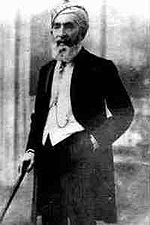 |
21 February 1879 | 12 October 1879 |
| Abdur Rahman Khan Abdur Rahman Khan Abdur Rahman Khan was Emir of Afghanistan from 1880 to 1901.The third son of Mohammad Afzal Khan, and grandson of Dost Mohammad Khan, Abdur Rahman Khan was considered a strong ruler who re-established the writ of the Afghan government in Kabul after the disarray that followed the second... |
 |
31 May 1880 | 1 October 1901 |
| Habibullah Khan |
 |
1 October 1901 | 20 February 1919 |
| Nasrullah Khan |
 |
20 February 1919 | 28 February 1919 |
| Amanullah Khan Amanullah Khan Amanullah Khan was the King of the Emirate of Afghanistan from 1919 to 1929, first as Amir and after 1926 as Shah. He led Afghanistan to independence over its foreign affairs from the United Kingdom, and his rule was marked by dramatic political and social change... |
28 February 1919 | 14 January 1929 | |
| Inayatullah Khan Inayatullah Khan Inayatullah Khan Seraj was the King of Afghanistan from 14 January 1929 to 17 January 1929. He was the son of former Afghan King, Habibullah Khan... |
14 January 1929 | 17 January 1929 | |
| Habibullāh Kalakāni |
17 January 1929 | 13 October 1929 | |
| Mohammed Nadir Shah Mohammed Nadir Shah Mohammed Nadir Shah was King of Afghanistan from 15 October 1929 until his assassination in 1933. Previously, he served as Minister of War, Afghan Ambassador to France, and as a general in the military of Afghanistan... |
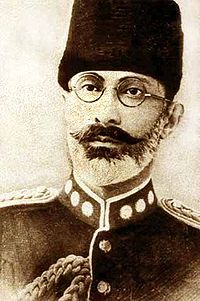 |
13 October 1929 | 8 November 1933 |
| Mohammed Zahir Shah Mohammed Zahir Shah Mohammed Zahir Shah was the last King of Afghanistan, reigning for four decades, from 1933 until he was ousted by a coup in 1973... |
8 November 1933 | 17 July 1973 |
See also
- List of Presidents of Afghanistan
- President of AfghanistanPresident of AfghanistanAfghanistan has only been a republic between 1973 and 1992 and from 2001 onwards. Before 1973, it was a monarchy that was governed by a variety of kings, emirs or shahs...
- Prime Minister of AfghanistanPrime Minister of AfghanistanThe Prime Minister of Afghanistan is a currently defunct post in the Afghan Government.The position was created in 1927, and was appointed by the king, mostly as an advisor, until the end of the monarchy in 1973...
- Name of AfghanistanName of AfghanistanThe name of Afghanistan is believed to be as old as the ethnonym Afghan, which is documented in a 10th century geography book called Hudud ul-'alam focusing on territories south of the Hindu Kush around the Sulaiman Mountains. The root name "Afghan" has been used historically in reference to the...
- Delhi SultanateDelhi SultanateThe Delhi Sultanate is a term used to cover five short-lived, Delhi based kingdoms or sultanates, of Turkic origin in medieval India. The sultanates ruled from Delhi between 1206 and 1526, when the last was replaced by the Mughal dynasty...
- History of AfghanistanHistory of AfghanistanThe written history of Afghanistan can be traced back to the Achaemenid Empire ca. 500 BCE, although evidence indicates that an advanced degree of urbanized culture has existed in the land since between 3000 and 2000 BCE. Alexander the Great and his Macedonian army arrived to Afghanistan in 330 BCE...

